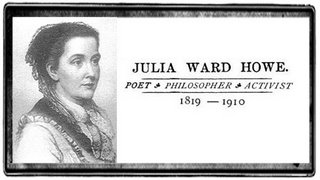The Real Meaning Behind Mother's Day

"Arise, then, women of this day! Arise all women who have hearts .... Say firmly: Our husbands shall not come to us, reeking with carnage, for caresses and applause. Our sons shall not be taken from us to unlearn all that we have been able to teach them of charity, mercy and patience. We women of one country will be too tender of those of another country to allow our sons to be trained to injure theirs."
-Peace Activist Julia Ward Howe (1819-1910)
Julia was instrumental in creating Mother's Day in 1870 in reaction to the carnage and suffering of the Civil War. She envisioned women around the world would meet on this day to discuss ways to achieve world peace:
She saw some of the worst effects of the war -- not only the death and disease which killed and maimed the soldiers. She worked with the widows and orphans of soldiers on both sides of the war, and realized that the effects of the war go beyond the killing of soldiers in battle. She also saw the economic devastation of the Civil War, the economic crises that followed the war, the restructuring of the economies of both North and South.According to About Women's History, as Julia became more famous, she was frequently asked to speak at public events. While her husband never actively supported her activism, he became less adamant that she remain a private person. Over time, his "resistance eased."
In 1870, Julia Ward Howe took on a new issue and a new cause. Distressed by her experience of the realities of war, determined that peace was one of the two most important causes of the world (the other being equality in its many forms) and seeing war arise again in the world in the Franco-Prussian War, she called in 1870 for women to rise up and oppose war in all its forms. She wanted women to come together across national lines, to recognize what we hold in common above what divides us, and commit to finding peaceful resolutions to conflicts. She issued a Declaration, hoping to gather together women in a congress of action.
She failed in her attempt to get formal recognition of a Mother's Day for Peace. Her idea was influenced by Anna Jarvis, a young Appalachian homemaker who had attempted starting in 1858 to improve sanitation through what she called Mothers' Work Days. She organized women throughout the Civil War to work for better sanitary conditions for both sides, and in 1868 she began work to reconcile Union and Confederate neighbors.
Anna Jarvis' daughter, also named Anna Jarvis, would of course have known of her mother's work, and the work of Julia Ward Howe. Much later, when her mother died, this second Anna Jarvis started her own crusade to found a memorial day for women. The first such Mother's Day was celebrated in West Virginia in 1907 in the church where the elder Anna Jarvis had taught Sunday School. And from there the custom caught on — spreading eventually to 45 states. Finally the holiday was declared officially by states beginning in 1912, and in 1914 the President, Woodrow Wilson, declared the first national Mother's Day.



0 Comments:
Post a Comment
<< Home